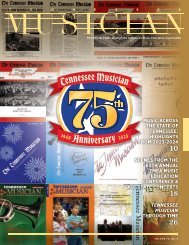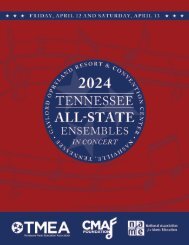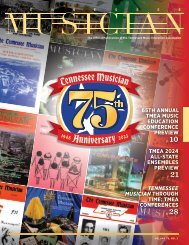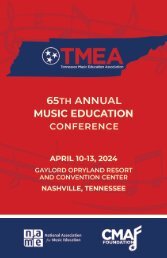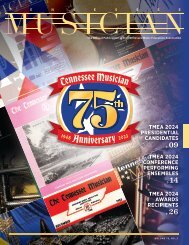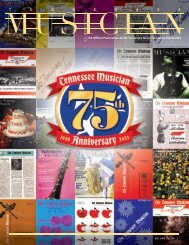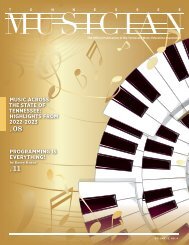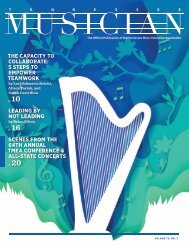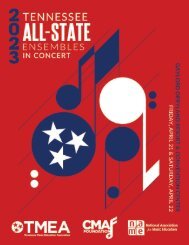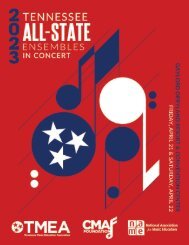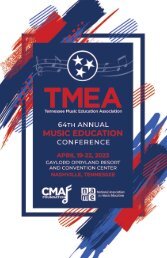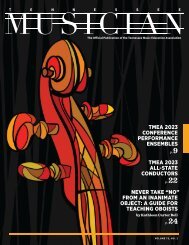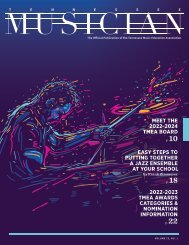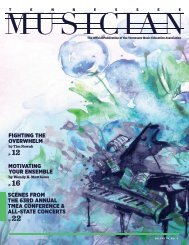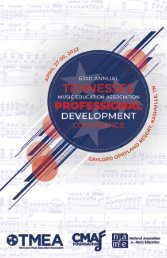Create successful ePaper yourself
Turn your PDF publications into a flip-book with our unique Google optimized e-Paper software.
The Official Publication of the Tennessee Music Education Association<br />
REIGNITED AND <strong>REV</strong>ITALIZED:<br />
BEING A MENTOR TEACHER<br />
IN THE COVID-19 PANDEMIC<br />
by Kristina Westover<br />
p. 16<br />
TMEA HIGHER<br />
EDUCATION UPDATE<br />
by Robert Bryant<br />
p. 19<br />
HOW DO WE R.E.H.E.A.R.S.E.?<br />
by Jason Worzbyt<br />
p. 20<br />
DIGITAL BADGING<br />
IN MUSIC EDUCATION<br />
by Stephanie Riley<br />
p. 26<br />
VOLUME <strong>74</strong>, NO. 1
School of<br />
Music<br />
Scholarship<br />
Audition Dates<br />
Friday, February 4, 2022<br />
Friday, February 18, 2022<br />
Friday, March 4, 2022<br />
tntech.edu/music<br />
(931) 372-3161<br />
music@tntech.edu<br />
CFA149-PRNT-22<br />
1150 N. Dixie Ave.<br />
Campus Box 5045<br />
Cookeville <strong>TN</strong> 38505-0001
IN YOUR SCHOOL’S STORY<br />
TRI-M<br />
COULD BE THE<br />
MOST<br />
IMPORTANT<br />
CHAPTER<br />
Tri-M® is the only national honor society for student musicians in<br />
the country. It highlights your school’s music program and gives<br />
students the opportunity to perform, lead, and serve.<br />
Besides looking good on a college application, a Tri-M® Music<br />
Honor Society chapter is easy to start, easy to run, and benefits<br />
your students, the school, and the community.<br />
Over 2,300 Tri-M chapters already enrich the lives of over 85,000+<br />
students throughout the country and around the globe.<br />
START A CHAPTER<br />
MusicHonors.com<br />
®
TABLE OF CONTENTS 2021 VOLUME <strong>74</strong>, NO. 1<br />
04<br />
05<br />
PROGRAM NOTES<br />
TMEA Board and Council Directory<br />
2021-2022<br />
Tennessee <strong>Musician</strong> Advertiser Index<br />
Issue <strong>No</strong>. 1<br />
07<br />
09<br />
Prelude - A Message from the Editor<br />
Anna Laura Williams<br />
TMEA President’s Message<br />
Alexis Yatuzis-Derryberry<br />
12<br />
16<br />
BY THE NUMBERS/VERBATIM<br />
Stop and Hear the Music<br />
Lisa Burden, Contributing Columnist<br />
TEACHING IN TENNESSEE<br />
Reignited and Revitalized: Being a Mentor<br />
Teacher in the COVID-19 Pandemic<br />
by Kristina Westover<br />
Tennessee <strong>Musician</strong> is mailed to members four times each year at an annual<br />
subscription rate of $6.00 (included in dues).<br />
<strong>No</strong>n-member subscription rate (includes S&H): $30.00 per school year;<br />
single copies: $10.00 per issue.<br />
GUEST FEATURES<br />
19<br />
TMEA Higher Education Update<br />
by Robert Bryant<br />
20<br />
How Do We R.E.H.E.A.R.S.E.?<br />
by Jason Worzbyt<br />
31<br />
TMEA Back Then<br />
October 1963<br />
26<br />
Digital Badging in Music Education<br />
by Stephanie Riley<br />
R E H E A R S E<br />
Postmaster - Send address changes to:<br />
Tennessee <strong>Musician</strong><br />
c/o Tennessee Music Education Association<br />
2441-Q Old Fort Pkwy, #635<br />
Murfreesboro, <strong>TN</strong> 37128-4162<br />
Published by Slate Group: 6024 45th Street, Lubbock, Texas 79407.<br />
Graphic Design: Nikki Davis. Account Executive: Ian Spector (800-794-5594).<br />
<strong>No</strong>n-Profit 501(c)(3) Organization. U.S. Postage Paid at Lubbock, Texas.<br />
ISSN Number 0400-3332; EIN number 20-3325550.<br />
Copyright © 2021 Tennessee Music Education Association. Reproduction in any form<br />
is illegal without the express permission of the editor: Anna Laura Williams, Managing<br />
Editor & Advertising Manager; anna.laura.williams@tnmea.org.<br />
Tennessee Music Education Association | www.tnmea.org | 3
TMEA BOARD AND COUNCIL<br />
national executive board - national association for music education<br />
Southern Division Immediate Past-President<br />
Dian Eddleman<br />
deddleman@usjbruins.org<br />
tmea executive board<br />
TMEA Executive Director<br />
Michael W. Chester<br />
michael.chester@tnmea.org<br />
TMEA President<br />
Alexis Yatuzis-Derryberry<br />
alexis.yatuzisderryberry@tnmea.org<br />
TMEA President-Elect<br />
Ryan Fisher, Ph.D.<br />
rfisher3@memphis.edu<br />
TMEA Immediate Past-President<br />
Lafe Cook<br />
lcook@k12k.com<br />
TMEA Secretary<br />
Dian Eddleman<br />
deddleman@usjbruins.org<br />
board of directors<br />
TMEA State General Music Chair<br />
Franklin Willis<br />
franklin.willis@mnps.org<br />
TMEA State Choral Chair<br />
Jason Whitson<br />
whitsonj@btcs.org<br />
TMEA State Orchestra Chair<br />
Anna Maria Miller<br />
amamiller@bellsouth.net<br />
TMEA State Band Chair<br />
Jacob Campos<br />
jacob.campos@wcs.edu<br />
TMEA State Higher Education Chair<br />
Robert Bryant, Ph.D.<br />
rbryan14@tnstate.edu<br />
TMEA NAfME Collegiate Chair<br />
Jody Blake, Ph.D.<br />
jblake17@utm.edu<br />
TMEA Society for Music Teacher<br />
Education/Research Chair<br />
Loneka Wilkinson Battiste, Ph.D.<br />
lbattis2@utk.edu<br />
TMEA Advocacy and<br />
Government Relations Chair<br />
Christopher Dye, Ed.D.<br />
christopher.dye@mtsu.edu<br />
TMEA Publications Editor and<br />
Advertising Manager<br />
Anna Laura Williams<br />
anna.laura.williams@tnmea.org<br />
tmea council<br />
WTGMEA President<br />
Jennifer Proseus<br />
wtgmeamemphis@yahoo.com<br />
WTGMEA President-Elect<br />
Harrison Howle<br />
howle.harrison@hardingacademymemphis.org<br />
WTVMEA President<br />
Sharon Morris<br />
smorris@lced.net<br />
WTVMEA President-Elect<br />
Adrian Maclin<br />
maclinal@scsk12.org<br />
WTSBOA President<br />
Jennifer Cupples<br />
jennifer.cupples@wcsk12tn.net<br />
WTSBOA President-Elect<br />
Benjamin Martin<br />
bmartin@huntingdonschools.net<br />
project chairs<br />
TMEA Guitar Education<br />
(Modern Band) Chair<br />
Ryan Payne<br />
payner@rcschools.net<br />
TMEA Jazz Education Policy Chair<br />
Ollie Liddell, Ph.D.<br />
ollie_liddell@hotmail.com<br />
TMEA Music in Our Schools Month Chair<br />
Tiffany Barton<br />
tntreblechoir@gmail.com<br />
TMEA Music Merchants Industry Chair<br />
Nick Averwater<br />
nick@amromusic.com<br />
TMEA Retired Teachers Chair<br />
Bobby Jean Frost<br />
bjfrost@aol.com<br />
TMEA Tri-M Co-Chair<br />
Dian Eddleman<br />
deddleman@usjbruins.org<br />
4 | TENNESSEE MUSICIAN | 2021 | <strong>Vol</strong>ume <strong>74</strong>, <strong>No</strong>. 1<br />
MTGMEA President<br />
Corynn York<br />
yorkc@rcschools.net<br />
MTGMEA President-Elect<br />
Abbi Miller<br />
abigail.miller@cityschools.net<br />
MTVA President<br />
Gerald Patton, Ed.D.<br />
pattong@rcschools.net<br />
MTVA President-Elect<br />
Lorna Pyka<br />
lornapyka@yahoo.com<br />
MTSBOA President<br />
J.R. Baker<br />
john.baker@rcstn.net<br />
MTSBOA President-Elect<br />
Stacy Jernigan<br />
stacy.jernigan000@gmail.com<br />
TMEA Tri-M Co-Chair<br />
Anna Laura Williams<br />
anna.laura.williams@tnmea.org<br />
TMEA Webmaster<br />
John Womack<br />
webmaster@tnmea.org<br />
all-state management team<br />
<strong>TN</strong> All-State Choral Chair<br />
Brian Russell, DMA<br />
brian.russell@tnmea.org<br />
<strong>TN</strong> All-State Instrumental Chair<br />
Carter <strong>No</strong>blin<br />
noblinc@wcschools.com<br />
ETGMEA President<br />
Bryant Adler<br />
badler@alcoaschools.net<br />
ETGMEA President-Elect<br />
Hannah White<br />
hannah.white@maryvillecollege.edu<br />
ETVA President<br />
Deborah Gouge<br />
debbie.gouge@ecschools.net<br />
ETVA President-Elect<br />
Kristen Wiram<br />
wiram_k@hcde.org<br />
ETSBOA President<br />
Donald Benton<br />
dbenton@bradleyschools.org<br />
ETSBOA President-Elect<br />
Jim Burton<br />
jburton@clevelandschools.org<br />
ensemble chairs<br />
<strong>TN</strong> Treble Honor Choir Chair<br />
Tiffany Barton<br />
tntreblechoir@gmail.com<br />
<strong>TN</strong> All-State Jazz Band Chair<br />
Cord Martin<br />
corderyl.martin@gmail.com<br />
conference management team<br />
TMEA Conference Chair<br />
Ryan Fisher, Ph.D.<br />
rfisher3@memphis.edu<br />
TMEA Conference Exhibits Chair<br />
Jo Ann Hood<br />
jhood10105@aol.com<br />
TMEA Conference Registration Chair<br />
Mark Garey<br />
mgarey86@comcast.net<br />
TMEA Conference Performance<br />
Group Chair<br />
John Mears<br />
tmeaperformancechair@gmail.com
TENNESSEE MUSICIAN ADVERTISER INDEX | VOLUME <strong>74</strong>, <strong>No</strong>. 1<br />
Tennessee <strong>Musician</strong><br />
The Official Publication of the<br />
Tennessee Music Education<br />
Association<br />
The Tennessee Music Education<br />
Association (TMEA) was officially<br />
formed in 1945 as a voluntary, nonprofit<br />
organization representing<br />
all phases of music education at all<br />
school levels. The mission of TMEA<br />
is to promote the advancement of<br />
high-quality music education for all.<br />
Active TMEA membership is open to<br />
all persons currently teaching music<br />
and others with a special interest<br />
or involvement in music education.<br />
Collegiate memberships and<br />
retired memberships are available.<br />
Additional membership information<br />
is available on the TMEA website:<br />
www.tnmea.org.<br />
Inside Front Cover<br />
Tennessee Tech. University<br />
University of Memphis<br />
Inside Back Cover<br />
University of Tennessee at Chattanooga<br />
Back Cover<br />
Lee University<br />
The Tennessee <strong>Musician</strong> was<br />
founded in 1948 with J. Clark Rhodes<br />
appointed by the TMEA Board of<br />
Control as inaugural editor.<br />
Tennessee <strong>Musician</strong> was preceded<br />
by an earlier publication, Tennessee<br />
Music Editors’ Downbeat, which was<br />
discontinued by the TMEA Board of<br />
Control at the spring board meeting,<br />
held in Chattanooga, Tennessee, in<br />
1948.<br />
All advertising and editorial<br />
materials should be sent to<br />
Anna Laura Williams, Managing<br />
Editor and Advertising Manager;<br />
anna.laura.williams@tnmea.org;<br />
615-784-8632.<br />
08 | Maryville College<br />
10 | Middle Tennessee<br />
State University<br />
11 | String Theory Music<br />
14 | University of Tennessee<br />
Knoxville School of Music<br />
15 | University of Tennessee<br />
Knoxville Bands<br />
24 | University of Tennessee<br />
at Martin<br />
25 | Yamaha Corporation<br />
of America<br />
30 | Slate Group<br />
Advertising information is available<br />
on the TMEA website:<br />
https://www.tnmea.org/advertising.<br />
html. Submit editorial materials by<br />
e-mail in Microsoft Word format.<br />
<strong>No</strong>n-member subscriptions and<br />
single copy orders can be placed via<br />
e-mail to the editor.<br />
Deadlines for advertisement orders<br />
and editorial materials:<br />
Issue <strong>No</strong>. 1 – Deadline: September 15<br />
(in home delivery: October/<strong>No</strong>vember);<br />
Issue <strong>No</strong>. 2 – Deadline: <strong>No</strong>vember 15<br />
(in home delivery: December/January);<br />
Issue <strong>No</strong>. 3 – Deadline: February 15<br />
(in home delivery: March/April);<br />
Issue <strong>No</strong>. 4 – Deadline: April 15<br />
(in home delivery: May/June)<br />
The views and opinions expressed in<br />
the articles included in the Tennessee<br />
<strong>Musician</strong> are those of the authors and<br />
do not necessarily reflect the official<br />
policy or position of TMEA, the<br />
members, the staff, or the advertisers.<br />
Tennessee Music Education Association | www.tnmea.org | 5
IN THIS ISSUE . . .<br />
BY THE NUMBERS/VERBATIM<br />
Ê “Stop and Hear the Music,” by Lisa Burden<br />
spotlights the benefits of listening to music.<br />
TEACHING IN TENNESSEE<br />
Ê “Reignited and Revitalized: Being a Mentor<br />
Teacher in the COVID-19 Pandemic,”<br />
by Kristina Westover provides a positive<br />
firsthand perspective about choosing to<br />
become a mentor teacher.<br />
Ê<br />
“TMEA Higher Education Update,” by<br />
Robert Bryant highlights new initiatives and<br />
opportunities during the 2021-2022 academic year<br />
for higher education teachers across Tennessee.<br />
Ê “TMEA Back Then” revisits the October 1963<br />
issue of the Tennessee <strong>Musician</strong>.<br />
GUEST FEATURES<br />
Ê “How Do We R.E.H.E.A.R.S.E.?” by Jason<br />
Worzbyt explores the rehearsal process with<br />
thoughts that directors of all types of ensembles<br />
can consider.<br />
Ê<br />
“Digital Badging in Music Education,”<br />
by Stephanie Riley describes an innovative<br />
way that music educators can incorporate<br />
technology in elementary, middle, and high<br />
school music classes and ensembles.<br />
6 | TENNESSEE MUSICIAN | 2021 | <strong>Vol</strong>ume <strong>74</strong>, <strong>No</strong>. 1
PRELUDE - A MESSAGE FROM THE EDITOR<br />
Anna Laura Williams<br />
Siegel Middle School<br />
DURING TRYING TIMES, OUR STRENGTH AS<br />
A TEAM OF TENNESSEE MUSIC EDUCATORS<br />
IS RENEWED WHEN WE CHOOSE TO<br />
WITHSTAND THESE MOMENTS TOGETHER.<br />
STRENGTH AND STABILITY<br />
Autumn has arrived. This annual seasonal change in Tennessee<br />
is one of the most visually artistic transformations across our<br />
statewide landscape. During these fleeting months, the vibrancy<br />
of the colorful, ever-changing leaves illustrates a striking scene<br />
every morning.<br />
As the leaves fall, we begin to see the intricate framework<br />
beneath their beauty that provides stability. Although storms<br />
may come along the way that test their might, the underlying<br />
structures can become strengthened in the aftermath of these<br />
experiences.<br />
Similarly, the music educators across Tennessee have<br />
weathered some challenges during the previous year. Through<br />
it all, every member of the Tennessee Music Education<br />
Association has been (and continues to be) an integral<br />
part of the system that forms a constant base for music<br />
students across our state. The first part of this school year has<br />
marked a time where many of us have been rebuilding and<br />
reconnecting through music.<br />
REBUILDING<br />
. . . our programs.<br />
In several ways, we may need to employ similar efforts and<br />
strategies that are needed to develop a new music program. For<br />
those of us who have “started a program from scratch” at some<br />
point in our careers, we know it personally takes a great amount<br />
of energy, vision, and resiliency. This year, we can reestablish or<br />
create positive musical cultures within our schools by modeling<br />
constructive habits and fostering essential values in our music<br />
students. Working together through the difficulties makes the<br />
victories all the more rewarding. These shared experiences with<br />
our students, our music families, and our colleagues culminate<br />
to build not only our programs but our unity.<br />
. . . our teaching.<br />
Everyone has a unique teaching style, but we all have a distinct<br />
commonality: we are teaching students who have been<br />
impacted in some way (either directly or indirectly) by the prior<br />
year. One of the most valuable resources we have as teachers<br />
is each other. This community encompasses those who teach<br />
every music concentration and age level of students.<br />
RECONNECTING<br />
. . . with our students.<br />
Seeking ways to combat recent student learning loss has been a<br />
topic at the forefront of discussions for many educators across<br />
all content areas. We know quite well how prominent this matter<br />
is in the field of music. Over the past school year, students have<br />
become further immersed in a world of technology. This year,<br />
many of these students will be experiencing their first in-person<br />
music experiences. As we consider how to plan instructional<br />
elements for our specific ensembles and music classrooms, we<br />
can consciously help bridge this transition for our students. We<br />
can make it a goal to incorporate teaching our students how to<br />
responsibly utilize technology while also engaging them in the<br />
group music making process.<br />
. . . with music.<br />
Regaining positive musical interactions is not solely linked<br />
to our students. We as music educators should make our own<br />
personal wellbeing a priority. Likewise, we should continue to<br />
consider how we can assist current and future music educators.<br />
In our individual music settings, there will be external elements<br />
beyond our control. During trying times, our strength as a team<br />
of Tennessee music educators is renewed when we choose<br />
to withstand these moments together. Our Tennessee Music<br />
Education Association is strong because of you and the music<br />
support you provide your students. In making the decision<br />
every day to help others through music education, please know<br />
that you are a vital part of the foundation of our organization.<br />
It is my sincerest desire that you find the materials in the<br />
publication helpful as we continue to rebuild and reconnect<br />
through music during this season.<br />
Anna Laura Williams<br />
17th Editor, Tennessee <strong>Musician</strong><br />
Inspired by the theme of the opening message by former TMEA President O’Dell<br />
Willis in the “TMEA Back Then” featured issue:<br />
“. . . two cornerstones of TMEA . . . strength and stability.”<br />
(Tennessee <strong>Musician</strong>, October 1963, <strong>Vol</strong>. 16, <strong>No</strong>. 1)<br />
Tennessee Music Education Association | www.tnmea.org | 7
EVERYDAY<br />
UNEXPECTED.<br />
Develop and showcase your talents alongside caring professors and student-musicians<br />
in a state-of-the-art venue that gives you unexpected opportunities to perform, work and<br />
prepare for a wide range of careers in music.<br />
MARYVILLE COLLEGE MUSIC DEPARTMENT<br />
Degrees and performance opportunities:<br />
B.A. in Music, B.M. in Music Education,<br />
B.M. in Piano Performance, B.M. in Vocal Performance,<br />
B.M. in Music Theory/Composition<br />
Ensembles: Concert Choir, Orchestra, Concert Band,<br />
Jazz Band, instrumental and voice chamber ensembles.<br />
Scholarships available up to full-tuition for Music majors.<br />
Apply online for free at<br />
maryvillecollege.edu/apply<br />
For details, contact Admissions at<br />
865.981.8092<br />
admissions@maryvillecollege.edu<br />
maryvillecollege.edu/fine-arts<br />
MARYVILLECOLLEGE.EDU 502 E. LAMAR ALEXANDER PKWY., MARYVILLE TENNESSEE 37804
TMEA PRESIDENT’S MESSAGE<br />
Alexis Yatuzis-Derryberry<br />
Stewarts Creek High School<br />
TENNESSEE MUSIC<br />
EDUCATION ASSOCIATION<br />
63rd Annual Professional<br />
Development Conference<br />
APRIL 27-30, 2022<br />
Gaylord Opryland Resort and Convention Center<br />
Nashville, Tennessee<br />
NOW ACCEPTING<br />
RESEARCH AND BEST PRACTICE<br />
POSTER SESSION PROPOSALS<br />
Submission Deadline:<br />
December 10, 2021, by 11:59 p.m. (CST)<br />
Visit the TMEA website for details<br />
and the online application:<br />
www.tnmea.org/call-for-research-posters-andpresentation-proposals.html<br />
If you have questions, please email:<br />
TMEA SMTE/Research Chair,<br />
Dr. Loneka Wilkinson Battiste: lbattis2@utk.edu<br />
or contact the TMEA Office : 615-784-8632<br />
REQUESTS FOR MEETINGS,<br />
RECEPTIONS, AND CATERING<br />
Submission Deadline:<br />
December 10, 2021, by 11:59 p.m. (CST)<br />
Visit the TMEA website for details<br />
and the online application:<br />
www.tnmea.org/request-for-meetings-receptions--<br />
catering.html<br />
If you have questions, please email:<br />
TMEA Conference Chair,<br />
Dr. Ryan Fisher: rfisher3@memphis.edu<br />
or contact the TMEA Office: 615-784-8632<br />
As you read this message, we<br />
are already knee-deep into the<br />
2021-2022 school year. I know<br />
that this year hasn’t panned<br />
out like many of us expected. So<br />
far this year, COVID-19 cases<br />
among students and educators<br />
have fluctuated and protocols<br />
have been constantly changing.<br />
We are all trying to prepare for a<br />
future we cannot predict. Please<br />
know that your regional and state music leaders are in constant contact<br />
discussing each regions’ challenges and are working together to create a plan<br />
to assist where we can.<br />
We are planning ahead for an in-person Tennessee Music Education<br />
Association Professional Development Conference and All-State<br />
Concerts on April 27-April 30, 2022, at the Gaylord Opryland Hotel and<br />
Convention Center in Nashville, Tennessee. Performing groups that were<br />
invited to perform at the 2020 TMEA Conference have been reinvited to<br />
perform at the 2022 TMEA Conference. We are planning on using an online<br />
submission method (Jotform) to hold the Instrumental All-State Chair<br />
Auditions in advance prior to the conference so that we can offer an engaging<br />
student-centered event on Wednesday evening; the choral students will also<br />
have a similar student-centered experience later in the conference. We also<br />
have a Thursday evening teacher banquet planned at the conference where<br />
we can all break bread together and reconnect after two years apart.<br />
The deadline for TMEA Research and Best Practice Poster Session<br />
Proposals is quickly approaching. Individuals interested in applying<br />
to present a Research and Best Practice Poster Session at the 2022 TMEA<br />
Professional Development Conference can access the application form and<br />
additional information on the TMEA website.<br />
The deadline to submit Requests for Meetings, Receptions, and<br />
Catering for the 2022 TMEA Professional Development Conference<br />
is also coming soon. More information and the submission form are also<br />
located on the TMEA website.<br />
Special thank you to the TMEA Board, Council, and Conference Team<br />
members who have already been diligently working throughout the summer<br />
and fall to ensure that our conference will be an enjoyable experience for our<br />
conference attendees and All-State students!<br />
I wish you all the best during the rest of the fall season. As always, please do<br />
not hesitate to reach out if we may be of help to you!<br />
Alexis Yatuzis-Derryberry<br />
38th TMEA President<br />
Tennessee Music Education Association | www.tnmea.org | 9
Audition Dates for Fall 2022 Admission<br />
Saturday, February 5 or Saturday, February, 19<br />
Virtual auditions are also possible.<br />
More information about auditioning and available programs at mtsu.edu/music<br />
Ensembles from<br />
jazz to orchestra<br />
to commercial music<br />
Music living-learning<br />
community on campus<br />
SCHOOL OF MUSIC<br />
615-898-2469 • Angela.Satterfield@mtsu.edu<br />
0821-9660 / Middle Tennessee State University does not discriminate on the basis of race, color, national origin, sex, disability,<br />
age, status as a protected veteran, or any other category protected by law. See our full policy at mtsu.edu/iec.
SEASON THIRTEEN<br />
IN PAR<strong>TN</strong>ERSHIP WITH LEE UNIVERSITY AND THE<br />
HUNTER MUSEUM OF AMERICAN ART<br />
T W E N T Y<br />
21-22<br />
Gloria Chien<br />
ARTISTIC DIRECTOR<br />
Student & Music<br />
Teacher Tickets<br />
$10 - Concert<br />
$50 - Season Subscription<br />
October 19, 2021<br />
MENLO FAMILY TOUR<br />
“What You Are To Me”<br />
Kristin Lee VIOLIN<br />
Sean Lee VIOLIN<br />
Dmitri Atapine CELLO<br />
Hyeyeon Park PIANO<br />
Gloria Chien PIANO<br />
March 1, 2022<br />
CHAMBER MUSIC<br />
SOCIETYOF LINCOLN<br />
CENTER ON TOUR:<br />
“MAGICAL SCHUBERT”<br />
Alessio Bax PIANO<br />
Gloria Chien PIANO<br />
Benjamin Beilman<br />
VIOLIN<br />
David Requiro CELLO<br />
<strong>No</strong>vember 16, 2021<br />
BRAHMS HORN TRIO<br />
Radovan Vlatkovic ´<br />
HORN<br />
Soovin Kim VIOLIN<br />
Gloria Chien PIANO<br />
April 5, 2022<br />
MOZART AND BRAHMS<br />
Arnaud Sussmann<br />
VIOLIN<br />
Chad Hoopes VIOLIN<br />
Matthew Lipman<br />
VIOLA<br />
Tien-Hsin Cindy Wu<br />
VIOLA<br />
Nick Canellakis CELLO<br />
Colin Carr PIANO<br />
February 8, 2022<br />
BOHEMIAN RHAPSODY<br />
Alexander Sitkovetsky<br />
VIOLIN<br />
David Requiro CELLO<br />
Gloria Chien PIANO<br />
January 26-30, 2022<br />
OUTREACH INITIATIVE<br />
Rebecca Anderson VIOLIN<br />
Mika Sasaki PIANO<br />
JANUARY 29, 7:00 PM<br />
Concert At Mizpah<br />
Congregation<br />
JANUARY 30, 2:00 PM<br />
Annual Family Concert<br />
Hunter Museum Of<br />
American Art<br />
The Tucker<br />
foundation<br />
For more information, please visit us at stringtheorymusic.org
TMEA BY THE NUMBERS / VERBATIM<br />
by Lisa Burden<br />
STOP & HEAR<br />
The Music<br />
There’s an old English phrase that describes how the<br />
shoemaker always has the worst shoes or even goes<br />
barefoot; a modern equivalent might be that the<br />
computer expert is the last person to back up his/her<br />
work. 1 I wonder how many music educators have found<br />
themselves listening to music for enjoyment less and<br />
less. I’ve definitely had a gap of time where this was true<br />
for me. When live performances stopped and I couldn’t<br />
hear my students make live music. . . when I myself<br />
could not perform music. . . I found myself forgetting<br />
how much my favorite songs brought me pleasure. I<br />
had forgotten how my favorite genres made my day<br />
just a bit sunnier. The data below suggests that just<br />
simply listening to music has merit and is good for<br />
our mental health!<br />
ELEVATES MOOD AND EMOTION<br />
The Journal of Positive Psychology conducted<br />
a study in 2013 that discovered individuals who<br />
listened to music could be classified as happy and<br />
upbeat, and they were able to improve their mood<br />
and overall happiness in just a few weeks. 2<br />
REDUCES STRESS<br />
Dr. Daniel Levitin of McGill University in Montreal<br />
conducted a meta-analysis of 400 music studies<br />
that showed listening to music reduces the stress<br />
hormone cortisol. 3<br />
A study conducted by the University of London and<br />
Sonos surveyed 12,000 people and found that 75%<br />
said their stress was reduced when listening to their<br />
favorite song. 4<br />
1. Martin, Gary. “The shoemaker always wears the worst shoes: The meaning and<br />
origin of this phrase.” Phrasefinder. https://www.phrases.org.uk/meanings/theshoemaker-always-wears-the-worst-shoes.html<br />
2. Ferguson, Yuna L, and Kennon M Sheldon. “Trying to Be Happier Really Can Work:<br />
Two Experimental Studies.” The Journal of Positive Psychology 8, no. 1 (2013): 23–33.<br />
https://doi.org/10.1080/1<strong>74</strong>39760.2012.<strong>74</strong>7000.<br />
3. <strong>No</strong>votney, Amy. “Music as Medicine.” Monitor on Psychology. AmericanPsychological<br />
Association, <strong>No</strong>vember 2013. https://www.apa.org/monitor/2013/11/music#:~:text=<br />
The%20researchers%20found%20that%20listening,of%20the%20stress%20<br />
hormone%20cortisol.<br />
4. Morris, James. “Music Key to Reducing Stress and Improving Productivity,<br />
Study Says.” London Evening Standard, May 14, 2019. https://www.standard.<br />
co.uk/news/world/music-key-to-reducing-stress-and-improving-productivitystudy-says-a4141221.html.<br />
12 | TENNESSEE MUSICIAN | 2021 | <strong>Vol</strong>ume <strong>74</strong>, <strong>No</strong>. 1
IMPROVES FOCUS<br />
A Western Washington University study indicated that<br />
students with ADHD who had background music playing<br />
may result in a 38% increase in their test scores. 5<br />
HELPS RELAXATION<br />
Current findings indicated that music around 60 beats per<br />
minute can cause the brain to synchronize with the beat<br />
causing alpha brainwaves (frequencies from 8–14 hertz or<br />
cycles per second). 6<br />
REDUCES ANXIETY AND DEPRESSION<br />
A recent study by Dr. David Lewis-Hodgson of Mindlab<br />
International has shown instrumental, classical, or ambient<br />
music can help result in up to a 65% reduction of anxiety. 7<br />
Music brings us pleasure and releases our<br />
suffering. It can calm us down and pump<br />
us up. It helps us manage pain, run faster,<br />
sleep better, and be more productive.<br />
- Alex Doman, Entrepreneur and Music Producer<br />
CONCLUSION<br />
Something made us so passionate about music that we<br />
chose to share that passion with young people. Likely, it’s<br />
a collection of pieces, songs, and genres that made up our<br />
exciting musical heritage before today. There are pieces<br />
that make us elated and smile when we hear them on<br />
the radio, in a live performance, or even on a commercial.<br />
For me, there is music that I love so much that I laugh out<br />
loud with the glee of it all. Admittedly, it’s been a while<br />
since I’ve actively sought those favorite tunes. When is the<br />
last time you’ve tapped into that music that brings you joy?<br />
The research is clear that taking time to just listen can<br />
benefit our lives and ourselves so much! Music isn’t just our<br />
job. . . it’s clearly something we love or else we wouldn’t make it a<br />
career as well. I hope you take the time to put some headphones on<br />
or enjoy a drive with the music that YOU love! As I’ve reacquainted<br />
myself with some of my favorites, I can tell you that I think it will<br />
make your day!<br />
5. Mittag, Jennifer. “The Effects of Background Music on the Executive Function<br />
of Children with ADHD in the Classroom Setting: A Study Proposal.” Western<br />
CEDAR, 2020. https://cedar.wwu.edu/orwwu/vol10/iss1/4<br />
7. “5 Positive Effects Music Has on Your Mental Health.” Open Minds,<br />
February 10, 2020. https://www.openminds.org.au/news/5-positive-effectsmusic-mental-health.<br />
6. Kučikienė, Domantė, and Rūta Praninskienė. “The Impact of Music on the Bioelectrical<br />
Oscillations of the Brain.” Acta Medica Lituanica. Lithuanian Academy of Sciences<br />
Publishers, 2018. www.ncbi.nlm.nih.gov/pmc/articles/PMC6130927/.<br />
Tennessee Music Education Assocation | www.tnmea.org | 13
Whatever your musical passion may be,<br />
the University of Tennessee School of<br />
Music is here to help you achieve your<br />
dreams. Pursue your aspirations with<br />
confidence by joining the <strong>Vol</strong>unteer family.
TMEA TEACHING IN TENNESSEE<br />
REIGNITED AND<br />
<strong>REV</strong>ITALIZED:<br />
BEING A MENTOR<br />
TEACHER IN THE<br />
COVID-19 PANDEMIC<br />
by Kristina Westover<br />
Student teaching is difficult at any time, even in the<br />
best of situations. Even though my own student<br />
teaching placement occurred over ten years ago, I<br />
still remember it (with fear and anticipation) like it<br />
was yesterday. Student teaching was when I learned<br />
to drink coffee every morning and put on pajamas at<br />
5:00 p.m. For the first time in my life, I had to not only<br />
be awake before dawn but also friendly before dawn.<br />
Although it was challenging, at least my student<br />
teaching occurred during a “normal school year.” I<br />
remembered the magnitude of my difficulties during<br />
that time and multiplied that several times over to<br />
imagine what I am sure student teachers must have<br />
felt in the midst of a pandemic.<br />
16 | TENNESSEE MUSICIAN | 2021 | <strong>Vol</strong>ume <strong>74</strong>, <strong>No</strong>. 1
BEING A MENTOR TEACHER<br />
DURING THE COVID-19 PANDEMIC<br />
At the beginning of the 2020-2021 school year, I had an eightmonth-old<br />
infant and a two-year-old toddler. I was afraid of<br />
bringing COVID-19 home to my children, worried about my<br />
students’ academic and musical achievements, and concerned<br />
about maintaining quality teaching in my music program<br />
while transitioning in and out of the classroom with distance<br />
learning. I was particularly concerned about my full-year choir<br />
classes where we essentially could not sing.<br />
At the beginning of December, after toiling through the first<br />
semester of that year, I received an email from my principal<br />
asking me to become a mentor for a student teacher in the<br />
spring semester. My first thought was, “This is such an awful<br />
time to be taking on a student teacher! I have so much to do, and<br />
I am struggling to just get by with all of the new procedures.”<br />
But the more I considered it, the more I thought it might<br />
actually be the perfect time.<br />
That year, I had been reaching a point in my teaching unlike<br />
any other I had previously experienced. The overwhelming<br />
feeling of uncertainty, the fear of teaching in-person, and the<br />
immensity of figuring out new technology were causing me to<br />
feel burned out.<br />
HOW MENTORING A STUDENT TEACHER HELPED<br />
In walked my student teacher. Despite the complications<br />
we were facing, she was excited, motivated, and yearning for<br />
knowledge. Her enthusiasm was infectious and inspiring. My<br />
self-pitying streak of pandemic teaching completely turned<br />
around to focus on mentoring someone else. In guiding her<br />
through her first full classroom instruction, I saw my classes<br />
from a new perspective.<br />
My particular challenge for the year had been planning and<br />
preparing the choir classes. I could teach my quarter-long<br />
general music class materials almost as effectively online as I<br />
had during a typical year. However, my year-long choir classes<br />
were beginning to present a predicament: I had run through<br />
every analysis, composition, and research project that I had<br />
ever created, and I was only halfway through the year.<br />
I said to my student teacher, “I’ve reached the end of my plans<br />
with choir. I want to give you an opportunity: I am going to give<br />
you (almost) free rein to create and try any new project. If there<br />
is any activity that you’ve been dying to set up, now is the time<br />
to try it.”<br />
In my case, I had several elements in place that allowed<br />
this approach to be effective. I had a couple of choir classes<br />
with whom I had a strong, trusting relationship, and I knew<br />
my students would be open to trying anything. I also had a<br />
student teacher who within her first days of working with me<br />
had demonstrated she could be trusted to work efficiently,<br />
take her assignment seriously, and learn from mistakes when<br />
presenting a new activity.<br />
AT THE BEGINNING<br />
OF DECEMBER, AFTER<br />
TOILING THROUGH THE<br />
FIRST SEMESTER OF<br />
THAT YEAR, I RECEIVED<br />
AN EMAIL FROM MY<br />
PRINCIPAL ASKING ME TO<br />
BECOME A MENTOR FOR<br />
A STUDENT TEACHER IN<br />
THE SPRING SEMESTER. . .<br />
THE MORE I CONSIDERED<br />
IT, THE MORE I THOUGHT<br />
IT MIGHT ACTUALLY BE<br />
THE PERFECT TIME.<br />
I gave her time to brainstorm possible activities and then sat<br />
down with her to help her identify the shortfalls and benefits of<br />
each activity. She made a selection of a project for the students<br />
based on her own interests and experiences. She prepared the<br />
project outline, rubrics, and accompanying files. She presented<br />
her project to the students, and it was an enormous success.<br />
I asked my student teacher what she felt about being given<br />
the task of creating her own project from scratch: “I was very<br />
overwhelmed with the task. I had no idea where to start, what<br />
to include, and what activities could facilitate the project.<br />
However, this proved to be the single most helpful assignment<br />
I completed during student teaching. Having that opportunity<br />
Tennessee Music Education Association | www.tnmea.org | 17
MY SELF-PITYING<br />
STREAK OF PANDEMIC<br />
TEACHING COMPLETELY<br />
TURNED AROUND TO<br />
FOCUS ON MENTORING<br />
SOMEONE ELSE.<br />
IN GUIDING HER<br />
THROUGH HER FIRST<br />
FULL CLASSROOM<br />
INSTRUCTION, I SAW<br />
MY CLASSES FROM A<br />
NEW PERSPECTIVE.<br />
to practice creating a project from scratch has helped me to<br />
create other projects, to long-range plan and pace myself, and<br />
to create unit overviews to keep me on track.”<br />
MOVING FORWARD<br />
I cannot say what is a “better” or “worse” time to be a student<br />
teacher, but I do know that the future teachers who completed<br />
their student teaching during the 2020-2021 school year had a<br />
unique opportunity to discover how resourceful, flexible, and<br />
capable they could be during the most challenging situations.<br />
As my student teacher said, “[B]ecause of the pandemic, I<br />
feel that my student teaching experience was a safe space to<br />
problem solve, figure out new ways to think about teaching<br />
music, make mistakes, and improve every single day.”<br />
I was reignited and revitalized as a result of being a mentor<br />
teacher during the COVID-19 pandemic, and I am sure many<br />
other cooperating teachers who guided student teachers<br />
during that time in history could say they felt the same way.<br />
KRISTINA WESTOVER received her<br />
bachelor’s degree in Music Education<br />
from the University of Oklahoma<br />
and her master’s degree in Music<br />
Education from Michigan State<br />
University. She has taught over ten<br />
years, both Elementary Music and<br />
Middle School Vocal/General Music,<br />
and currently teaches at Fairview<br />
Middle School in Williamson County Schools. She was<br />
the recipient of a National Merit Scholarship, Outstanding<br />
Senior Award (University of Oklahoma Music Department),<br />
and New Directions Scholarship (Michigan State). Her<br />
research interests are Social Emotional Learning for Middle<br />
School <strong>Musician</strong>s and Music Educators’ Work-Life Balance.<br />
I WAS REIGNITED<br />
AND <strong>REV</strong>ITALIZED AS<br />
A RESULT OF BEING<br />
A MENTOR TEACHER<br />
DURING THE COVID-19<br />
PANDEMIC, AND<br />
I AM SURE MANY<br />
OTHER COOPERATING<br />
TEACHERS WHO GUIDED<br />
STUDENT TEACHERS<br />
DURING THAT TIME<br />
IN HISTORY COULD<br />
SAY THEY FELT THE<br />
SAME WAY.<br />
18 | TENNESSEE MUSICIAN | 2021 | <strong>Vol</strong>ume <strong>74</strong>, <strong>No</strong>. 1
TMEA HIGHER<br />
EDUCATION UPDATE<br />
Dear Higher Education Colleagues,<br />
I hope that you are experiencing a safe and productive start<br />
to this school year. As we chart a new course for music<br />
education amid the coronavirus pandemic, please know that<br />
you are essential to the success of music education programs<br />
throughout our state and beyond. I would like to share some of<br />
the ways that you can continue to make an impact as a TMEA<br />
member.<br />
TMEA HIGHER EDUCATION<br />
MEMBERSHIP INFORMATION<br />
We now have dedicated links on the TMEA website for joining<br />
and renewing membership as a higher education member.<br />
You can find the new links on the “Full Membership” page for<br />
each region (West, Middle, East). Included on each regional<br />
membership page are options for our collegiate members,<br />
music education and ensemble faculty, and a new higher<br />
education membership category for our applied faculty.<br />
TMEA APPLIED COLLEGE/<br />
UNIVERSITY FACULTY MEMBERSHIP<br />
We are excited for this new membership opportunity for our<br />
higher education applied music faculty. It is my pleasure<br />
to invite our applied faculty members to join TMEA at<br />
the special membership rate of $50 through this new<br />
membership category.<br />
Benefits of this level of membership include a<br />
complimentary exhibit hall badge for the 2022 TMEA<br />
Professional Development Conference as well as access to the<br />
TMEA All-State student and parent roster (for your applied<br />
area) that would contain contact information that could aid<br />
in recruiting future students. In addition, TMEA Applied<br />
Faculty members may have the opportunity to assist in the<br />
adjudication process for seating our All-State Instrumental<br />
Ensembles which would give these members a glimpse into<br />
future student recruits.<br />
Additional opportunities for TMEA Applied Faculty<br />
members may include masterclass presentations and faculty<br />
ensemble performances at future conferences. This could be<br />
an excellent opportunity for applied faculty to share more<br />
about their applied studios and recruit for both their<br />
universities and music programs.<br />
TMEA NAFME COLLEGIATE CHAIR AND<br />
TMEA SMTE/RESEARCH CHAIR<br />
The higher education division has been working tirelessly to<br />
keeping you updated on our programming for our collegiate<br />
members, music teacher educators, ensemble faculty and the<br />
larger music education community. I would like to extend a<br />
special thanks to TMEA NAfME Collegiate State Chair<br />
Dr. Jody Blake for the commendable work he has done to<br />
keep our collegiate membership engaged over the past year. I<br />
would also like to thank TMEA SMTE/Research Chair<br />
Dr. Loneka Wilkinson Battiste for her dedication and<br />
leadership in our research efforts.<br />
2022 TMEA PROFESSIONAL<br />
DEVELOPMENT CONFERENCE<br />
As a reminder, proposals for research posters and research<br />
presentations for the 2022 TMEA Professional Development<br />
Conference are open until December 10, 2021 (11:59 p.m.,<br />
CST). Please note that due to the cancellation of<br />
our 2020 and 2021 conferences, anyone accepted<br />
to present those years will need to resubmit their<br />
proposal for consideration for the 2022 TMEA<br />
Professional Development Conference. The application<br />
and additional information are located on the “Conference”<br />
page on the TMEA website. Links are included within Alexis<br />
Yatuzis-Derryberry’s President’s Message in this publication.<br />
Thank you all for your continued support and dedication to<br />
music education and our higher education division. For every<br />
setback we have had, we have also found new opportunities to<br />
get involved and support one another. Let’s continue to do so as<br />
we set our sights on the 2022 TMEA Professional Development<br />
Conference and beyond.<br />
With great hope,<br />
Robert Bryant, Ph.D.<br />
TMEA State Higher Education Chair<br />
TO JOIN TMEA<br />
as a Higher Education member, visit<br />
www.tnmea.org/full-membership.html<br />
DR. ROBERT L. BRYANT III currently serves as Music Education Coordinator at Tennessee State<br />
University. He earned degrees from Florida A&M University (B.S.), Florida State University<br />
(M.M.E.), Georgia Southern University (M.Ed.) and Mercer University (Ph.D.). Prior to his current<br />
role, Dr. Bryant taught as a middle and high school band director while also working in various<br />
roles in higher education for colleges and universities in Georgia and Alabama.<br />
Dr. Bryant is a member of the College Band Directors National Association, College Music<br />
Society, International Tuba Euphonium Association, Music Teachers National Association,<br />
National Association for Music Education, and is the advisor for the NAfME Collegiate Chapter at<br />
Tennessee State University. Dr. Bryant is the 2020-2022 TMEA Higher Education Chair.<br />
http://www.tnstate.edu/music/rbryant.aspx<br />
Tennessee Music Education Association | www.tnmea.org | 19
TMEA GUEST FEATURES<br />
HOW DO WE<br />
R E H E A R S E<br />
?<br />
by Jason Worzbyt, DMA<br />
As a young clarinetist and bassoonist growing up in rural<br />
western Pennsylvania, I was deeply fortunate to have<br />
two outstanding band directors that mentored me from<br />
elementary band through high school. Both of them provided<br />
me with the inspiration, confidence, and drive to become<br />
a music educator thanks to the exceptional modeling that<br />
they provided for me at an early age. They were very different<br />
in their approaches to their role as a conductor/teacher;<br />
however, their strengths complemented each other so well<br />
that they created a high-quality music program in a sparsely<br />
populated community. Thus began my early fascination with<br />
the rehearsal process and its impact upon a community of<br />
musicians.<br />
I am positive that my journey from student, to student teacher,<br />
to teacher, is not unique. I believe that all of us as music<br />
educators have been deeply influenced by one, or more than<br />
one, large ensemble conductor during our formative years.<br />
I am incredibly fortunate that I had excellent and inspiring<br />
conductors from my elementary band years all the way through<br />
my days in graduate school. I continue to be inspired by my<br />
colleagues where I teach and through the incredible teachers<br />
that I meet during my travels.<br />
As process-driven educators, I think it is healthy for us to<br />
take a step back and assess what we do in the classroom on a<br />
periodic basis. It not only keeps us fresh, but it also lets us<br />
take advantage of ideas, techniques, and concepts borrowed<br />
from friends, colleagues, and the top minds in our profession.<br />
I freely admit that about 95% of what I do in rehearsal is<br />
“stolen” from others. I am able to rationalize this by telling<br />
myself that I try to steal only from the best! It reminds me of<br />
a quote: “The definition of creativity is the ability to be able to<br />
hide your sources.”<br />
As I take a look back at almost 25 years of teaching, I came to<br />
realize that many of the concepts that we use in the classroom<br />
correspond to what we do in the form of an acronym –<br />
R.E.H.E.A.R.S.E. I thought it might be interesting to investigate<br />
these ideas one by one as a way of taking stock of what we do<br />
and also planning for the future. Here we go!<br />
<strong>REV</strong>EAL THE GENIUS OF THE COMPOSER<br />
R<br />
As music educators, we are all well aware that selecting<br />
repertoire for our students is perhaps the most important<br />
thing that we do for our students. In essence, we are choosing<br />
our textbook for the entire year. If you have never read<br />
H. Robert Reynold’s article, “Repertoire Is the Curriculum,”<br />
I highly recommend that you add it to your reading list. One<br />
of the points that I take away from this article is that when<br />
we choose a particular work for our ensemble, we are also<br />
choosing not to program hundreds of other works that could<br />
have filled that spot.<br />
Every time that I begin a new concert rotation with the IUP<br />
Symphony Band, I can feel the words of Frank Battisiti,<br />
former director of bands at New England Conservatory,<br />
hanging over my head—is our rehearsal going to be a place<br />
where music education takes place, or is it going to be a “drill<br />
shed?” I firmly believe that when we are teaching a new work<br />
to our ensembles, we teach the work as a comprehensive<br />
whole, rather than perfecting the composite parts that make<br />
up the composition. This is not to say that we should avoid<br />
eliminating error as part of our rehearsal process—far from<br />
it. However, if we focus solely on eliminating error, we as<br />
educators are falling short of showing our students how the<br />
compositional process works.<br />
ONE OF THE BIGGEST<br />
FAVORS THAT WE CAN DO<br />
FOR OUR ENSEMBLES IS TO<br />
MAINTAIN OUR SENSE OF<br />
EMPATHY AS WE TEACH.<br />
20 | TENNESSEE MUSICIAN | 2021 | <strong>Vol</strong>ume <strong>74</strong>, <strong>No</strong>. 1
Furthermore, we are depriving our students their role in the<br />
creative process if we take this “right vs. wrong” approach.<br />
If it is our duty to select the best repertoire possible for our<br />
students, then I also believe we have a responsibility to share<br />
with our students what attracted us to that repertoire, and then<br />
share with them the genius of that composer. If we are going<br />
to ask the third clarinets to play short, why? Is there a reason<br />
why this composer wrote several duets for alto saxophone<br />
and flute? The answers to these questions leads to greater<br />
understanding of the work by our students. During a rehearsal<br />
cycle, I will refer to and/or play recordings of other works<br />
that were written by a particular composer to demonstrate<br />
similarities in their style between different works as well<br />
as changes that appeared in their music over time. If we all<br />
subscribe to the concept that the purpose of rehearsal is not to<br />
learn our own part but to learn everyone else’s part, we will be<br />
well on our way to bringing a holistic view of the composition<br />
to our students.<br />
E<br />
ELIMINATE ERROR THROUGH THE LENS OF<br />
EDUCATION AND EXPRESSION<br />
One of the finest books that I have ever read that deals<br />
specifically with the rehearsal process is The <strong>Musician</strong>’s<br />
Soul by James Jordan, who is a member of the music<br />
faculty at Westminster Choir College. If you have not had<br />
the opportunity to read this book, I highly recommend its<br />
specific insights into the relationship between the conductor<br />
and the ensemble. Jordan states that during the rehearsal<br />
process, every conductor enters a rehearsal with an<br />
ideal sound for a particular work, assuming that they have<br />
taken the time to study the score in great detail. Early in<br />
the rehearsal cycle, the sound that the ensemble produces<br />
will likely not match the conductor’s ideal sound. In that<br />
split second, the conductor must make a choice on how<br />
they will respond to this stimulus. They can either respond<br />
as an educator with care and concern for their students, or<br />
they can make choices such as anger, sarcasm, distrust, and<br />
fear. While this is a bit of an oversimplification of Jordan’s<br />
writing, it drives home the fact that we must maintain<br />
our humanity during the rehearsal process and make the<br />
education of our students our top priority.<br />
Once we have located something that we want to adjust in<br />
rehearsal (tone, articulation, intonation, etc.), finding a way<br />
to relate that change to the musical expression of the work is<br />
often the most effective and meaningful to the student (this<br />
was stolen from Craig Kirchhoff, retired director of bands<br />
at the University of Minnesota). I often find that this is the<br />
hardest thing to do in the “white heat” of rehearsal, when we<br />
have a limited amount of time to work and many things to<br />
do. It is always easier to say, “louder, shorter, softer, louder,<br />
sharp, flat, etc.,” get the results that we are looking for, and<br />
move on. Personally, I am very guilty of not taking the time to<br />
relate a change to musical expression. However, I have seen<br />
time and time again that these moments spent in rehearsal<br />
are well worth the time and effort to our students’ education.<br />
H<br />
HEAR WHAT YOU SEE, AND SEE WHAT YOU HEAR<br />
(SCORE STUDY)<br />
I think another point that we can all agree upon is that<br />
mastery of the score is the key to any successful rehearsal and<br />
performance. There simply is not a substitute for knowing how<br />
a piece is put together, and how we will relate that knowledge to<br />
our students. If you are like me, the usual enemy to completing<br />
this task before the first rehearsal is time. The pressures and<br />
demands of our everyday lives frequently wreak havoc with<br />
even the best of intentions. The question then becomes, how<br />
do we thoroughly study a score with the limited time that we<br />
have available? Fortunately, there are many resources for the<br />
music educator that can help with this very sophisticated<br />
task. One of the best books that I know and that I recommend<br />
for my students is the Guide to Score Study by Frank Battisti<br />
and Robert Garofalo. In this text, you will find a treasure<br />
trove of ideas for studying your next set of scores. I would<br />
also recommend the Teaching Music Through Performance in<br />
Band series, as well as several volumes of Rehearsing the Band.<br />
E<br />
WHEN OUR STUDENTS<br />
WI<strong>TN</strong>ESS OUR PASSION,<br />
I CONTEND THAT IT<br />
ADDS FUEL TO THE<br />
GAS TANK IN OUR<br />
REHEARSAL AND<br />
ENERGIZES EVERYONE.<br />
EMPATHIZE AND ENERGIZE<br />
One of the most important lessons that I learned early in<br />
my teaching career is that our students have lives outside of<br />
music, and sometimes these lives present challenges that we<br />
cannot comprehend. Family issues, illness, financial troubles,<br />
academic difficulties, etc., do not stop when they enter our<br />
classroom. One of the biggest favors that we can do for our<br />
ensembles is to maintain our sense of empathy as we teach. By<br />
suggesting this, I am not saying that we abandon our classroom<br />
management or change our standards. What I am suggesting is<br />
that we maintain our humanity and vulnerability as we teach<br />
(another powerful lesson from The <strong>Musician</strong>’s Soul).<br />
Working in tandem with this is freely showing our passion,<br />
zeal, and enthusiasm for our students, the music, and the art<br />
that we are creating together. When our students witness<br />
Tennessee Music Education Association | www.tnmea.org | 21
our passion, I contend that it adds fuel to the gas tank in our<br />
rehearsal and energizes everyone. If we are trying to get more<br />
miles per gallon (i.e., the most efficient rehearsal), freely share<br />
your passion for the music and your students.<br />
A<br />
ADVOCATE FOR THE COMPOSER<br />
One of my favorite quotes about advocating for the composer<br />
is by Don Wilcox, retired director of bands at West Virginia<br />
University: we should become a pizza delivery boy for the<br />
composer! Unless we have the opportunity to communicate<br />
with a composer during a rehearsal of their work (which has<br />
become much easier through Skype, FaceTime, etc.), we spend<br />
most of our time in front of our ensembles trying to honor the<br />
composer’s wishes that he/she has left for us via the printed<br />
notation in the score. Even in the best of situations, this can<br />
be a complex and confusing task. While we are all aware of<br />
the limits of musical notation, this gives us the unique<br />
opportunity to combine our creativity and our ensemble’s<br />
creativity with the artistic intent of the composer.<br />
In other words, if we think of our rehearsal as a laboratory<br />
to try new ideas, we can come up with several possible<br />
interpretations as opposed to binary “right” and “wrong”<br />
solutions. I often compare this to painting by the numbers.<br />
When some of us were younger, we were given a “paint by the<br />
numbers” kit, which consisted of a black and white drawing<br />
filled with numbers and a set of paints that would be used<br />
to fill in the corresponding numbers. While I am sure that<br />
our loved ones were thrilled with what we were creating<br />
when we were younger, were we creating great art? It is my<br />
opinion that we were replicating someone else’s art and not<br />
creating an original work of our own. If we can strive for<br />
creation balanced by the composer’s intent, then our students<br />
will be able to experience the essence of the composer and<br />
create something original as well.<br />
R<br />
REMEMBER THE PURPOSE<br />
THAT THE REPERTOIRE SERVES<br />
This could be a whole article by itself! I have previously<br />
written about forming a philosophy of programming for<br />
our ensembles several months ago, but when we consider<br />
the transformative power that our art can have on today’s<br />
young people, choosing the right music is the most important<br />
thing that we do every year. Some questions to ponder:<br />
Ê<br />
Ê<br />
Ê<br />
Ê<br />
Your expectations in rehearsal and performance will<br />
be determined by the repertoire. Therefore, selecting<br />
repertoire that is appropriate for the ensemble is the most<br />
important decision that we make.<br />
Are we as conductors selecting repertoire that allows us,<br />
as well as our students, to have an aesthetic experience?<br />
Does the repertoire that we are selecting affect us and our<br />
students in such a way that other individuals outside our<br />
ensembles notice the profound changes within us?<br />
Are we selecting repertoire that allows us to have a “better<br />
band,” or allows our students to experience all of the facets<br />
of a complete music education?<br />
Regardless of the abilities of the students that we teach, we<br />
must select repertoire that aesthetically affects us so that we<br />
can bring that passion, dedication, and joy to our students.<br />
S<br />
SEEK OUT THE BEST MODELS FOR YOUR<br />
ENSEMBLES AND ENSEMBLE MEMBERS TO EMULATE<br />
I can still remember from my instrumental methods classes<br />
about the use of modeling as a powerful teaching tool. Rarely<br />
does a bassoon lesson, conducting class, or rehearsal go by<br />
that I do not demonstrate a sound, gesture, or concept for<br />
my students. As I try to continually grow as a teacher and<br />
performer, I am constantly searching for the best models<br />
to emulate. Whether it be performances of the University<br />
of Michigan Symphony Band or the sounds of Canadian<br />
bassoonist Christopher Millard, these artists continue to<br />
inspire me as well as provide excellent models for my future<br />
development.<br />
With the creation of YouTube, Spotify, etc., we now have<br />
access to a treasure trove of audio and video recordings that<br />
demonstrate the best that the music world has to offer. I<br />
use these resources frequently in my private lessons,<br />
classroom, and ensemble teaching to demonstrate the<br />
best aural models the world has to offer. Most recently,<br />
I have become aware of videos available by the Berlin<br />
Philharmonic called the Digital Concert Hall. While this<br />
service is available for a fee, the resources found at this<br />
website are amazing! I highly recommend them to you.<br />
I STILL CONTEND THAT<br />
WE HAVE THE BEST<br />
JOBS IN THE WORLD–<br />
PRACTICING OUR<br />
CHOSEN ART AND<br />
HELPING TO SHAPE<br />
YOUNG PEOPLE’S LIVES<br />
SO THAT THEY CAN<br />
EXPERIENCE A FULL<br />
EDUCATION IN WHAT IT<br />
MEANS TO BE HUMAN.<br />
22 | TENNESSEE MUSICIAN | 2021 | <strong>Vol</strong>ume <strong>74</strong>, <strong>No</strong>. 1
ENJOY!<br />
E<br />
<strong>No</strong> doubt, we are living in challenging times to be an arts<br />
educator. We are constantly receiving messages in the form<br />
of budget cuts, furloughs, competition for students with A.P.<br />
classes, and a laser-like focus on S.T.E.M. classes that can<br />
make even the most seasoned and enthusiastic educator feel<br />
a bit deflated. Despite all of this, I still contend that we have<br />
the best jobs in the world—practicing our chosen art and<br />
helping to shape young people’s lives so that they can<br />
experience a full education in what it means to be human.<br />
The challenge is to show this enthusiasm on a daily basis.<br />
Perhaps it is the eternal optimist in me, but I believe that if<br />
we look hard enough, we can see the fruits of our labor<br />
every single day. Whether it be one of our former students<br />
that becomes a band director and influences generations of<br />
students, or seeing one our students that gained confidence,<br />
self-esteem, and pride through being in our program. Success<br />
stories are all around us if we look hard enough.<br />
I want to close with one of my favorite quotes by Marian<br />
Wright Edelman: “Service is the rent that we pay for being.<br />
It is the very purpose of life, and not something you do in<br />
your spare time.” A career in music is spent in service to<br />
others. We serve the composer with our labors to realize their<br />
artistic vision; we serve our students with our dedication<br />
to their intellectual, emotional, and spiritual growth; and we<br />
serve our community by bringing the life-changing power<br />
of art into the public square.<br />
Let’s go out and have a great spring of music making!<br />
Music Education and<br />
Social Emotional Learning<br />
Reprinted from the Fall/Winter 2021 issue (<strong>Vol</strong>. 75, <strong>No</strong>. 1) of Iowa Music<br />
Educator with permission from the Iowa Music Educators Association.<br />
DR. JASON WORZBYT is Professor<br />
of Bassoon and conductor of the<br />
Symphony Band at Indiana University<br />
of Pennsylvania. He holds a B.S.<br />
in music education from Indiana<br />
University of Pennsylvania, an M.M.<br />
in wind conducting from the<br />
University of <strong>No</strong>rth Texas, and a<br />
DMA degree in bassoon performance<br />
from the University of <strong>No</strong>rth Texas.<br />
Worzbyt has studied bassoon with Kathleen Reynolds,<br />
principal bassoon of the Dallas Opera Orchestra and<br />
professor of bassoon at the University of <strong>No</strong>rth Texas;<br />
Kristen Wolfe Jensen, professor of bassoon at the<br />
University of Texas; Jim Rodgers, principal contrabassoon<br />
of the Pittsburgh Symphony; and David Borst, professor<br />
emeritus of bassoon at Indiana University of Pennsylvania.<br />
His conducting teachers include Jack Stamp, Emeritus<br />
Director of Band Studies at Indiana University of<br />
Pennsylvania, and Eugene Migliaro Corporon, Director of<br />
Wind Studies at the University of <strong>No</strong>rth Texas.<br />
This brochure answers:<br />
• How are music educators<br />
well-suited to help students<br />
develop socially and<br />
emotionally?<br />
• What does research tell us?<br />
• How can public policy<br />
support music education and<br />
Social Emotional Learning?<br />
Download your brochure at<br />
bit.ly/MusicEduSEL<br />
Questions? Email<br />
advocacy@nafme.org
DEDICATED Innovative INCLUSIVE<br />
APPLY & AUDITION<br />
Test Flight: Feb. 21, 2022<br />
Experience what it’s like to be a music major or<br />
minor at UT Martin and audition the same day.<br />
Additional audition dates upon request.<br />
Visit: utm.edu/audition<br />
SCHOLARSHIPS<br />
Available for music majors, music minors,<br />
and campus musicians. Early accept<br />
scholarship of $500 available for students who<br />
schedule an audition before Dec. 31, 2021.<br />
utm.edu/musicawards<br />
DEGREES<br />
Bachelor of Music<br />
Performance, Music Education, Pedagogy<br />
Bachelor of Arts in Music<br />
Music Minor<br />
NEW CERTIFICATES/PATHWAYS<br />
New to UTM Music: Add to your degree:<br />
Certificate in Secondary Music Studies<br />
Certificate in Music Performance<br />
Touring Pathways<br />
More info at utm.edu/musicacademics<br />
EVENTS FOR<br />
HIGH SCHOOL STUDENTS<br />
Sept. 9-10 – UTM Honor Choir<br />
Sept. 13-14 – Music & Event Production Career Days<br />
<strong>No</strong>v. 13 – Woodwind & Brass Day<br />
Jan. 27-29 – UTM Honor Band<br />
Feb. 20 – Death by Voice<br />
Feb. 21 – Test Flight<br />
Mar. 3-5 – Chamber Fest<br />
Register at<br />
utm.edu/musichighschoolevents<br />
For more information: (731)881-<strong>74</strong>02 | music@utm.edu | utm.edu/music<br />
The University of Tennessee is an EEO/AA/Title VI/Title IX/ Section 504/ADA/ADEA institution in the provision of its education and employment programs and services. All qualified applicants will receive equal consideration for employment without regard to race, color, national origin, religion, sex, pregnancy, marital status, sexual orientation, gender identity,<br />
age, physical or mental disability, or covered veteran status. Inquiries should be directed to the Office of Equity and Diversity (OED), 303 Administration Building, Martin, <strong>TN</strong> 38238, (731) 881-3505 Office, (731) 881-4889 TTY, Hearing Impaired, (731) 881-3507 Fax, equityanddiversity@utm.edu, http://www.utm.edu/departments/equalopp/. In compliance with the<br />
Jeanne Clery Disclosure of Campus Security Policy and Campus Crime Statistics Act (The Clery Act), UTM’s annual security report includes statistics for the previous three years concerning reported crimes that occurred on or around the campus and UTM’s emergency response and evacuation procedures. You can view the report at http://www.utm.edu/departments/<br />
publicsafety/_pdfs/annual security report 2014 adobe.pdf or you may obtain a paper copy of the report by contacting the Office of Public Safety, 215 Hurt Street, Martin, <strong>TN</strong> 38238 or calling (731) 881-7777. Data on intercollegiate athletics program participation rates and financial support may be found at http://www.utm.edu/about/consumer.php#3g and printed<br />
copies may be obtained through the Office of Intercollegiate Athletics, 1022 Elam Center, Martin, <strong>TN</strong> 38238 or by calling (731) 881-7660. E05-5220-00-004-22
EVEN TEACHERS<br />
NEED TEACHERS<br />
As an educator, one of the most impactful ways to improve is by educating yourself. That’s<br />
why the Yamaha Educator Suite (YES) helps music teachers access professional development<br />
opportunities, music teacher resources, program health support, advocacy assistance and<br />
more. YES brings you a network of like-minded teachers, experts and professionals, who want<br />
to help you achieve your goals. Let us help you raise the bar. Go to Yamaha.io/educatorsTM
TMEA GUEST FEATURES<br />
DIGITAL<br />
BADGING<br />
IN MUSIC EDUCATION<br />
by Stephanie M. Riley<br />
Digital badging has been around for a while<br />
in a variety of ways. It’s likely that you’re<br />
most familiar with the social media, personal<br />
development apps, and my beloved Google<br />
badges that you get for checking into certain<br />
places a certain amount of times, etc. In a<br />
time where technology is making its way into<br />
our classrooms at lightning speed, it seems<br />
digital badging in the music classroom could<br />
be very successful.<br />
WHAT IS DIGITAL BADGING?<br />
Digital badging is a system that individuals complete to<br />
show competency or achievement in any given area. It<br />
could be viewed as a digital portfolio or a digital checklist<br />
but with specific steps to be taken by the student in order to<br />
complete various tasks to complete the program.<br />
In our case as music educators, we would be music-based<br />
on our badges, and those programs can be completely<br />
tailored to your students: their grade level, ensemble,<br />
specific course, and specific school, just to name a few.<br />
PROGRAMS<br />
This is where you can begin the tailoring for your digital<br />
badging programs. Ask yourself a few questions as you<br />
begin this process:<br />
1. Do you want this to be a district-wide program?<br />
a. Benefits to a district-wide program: If a school has<br />
multiple elementary schools, this can help the<br />
elementary teacher prepare and share progress with<br />
the next teacher that a student will have within the<br />
district. Instrumental programs, of course, would be<br />
obvious programs that benefits, but choral programs<br />
and even general music programs can also benefit.<br />
b. Digital badging can work as though it’s a built-in<br />
rubric if designed carefully enough. These can be used<br />
district-wide.<br />
c. Digital badging is a great way to meet students<br />
where they are at. Advanced students have<br />
something tangible to work towards, and those<br />
who need more time and guidance have clear<br />
expectations laid out for them.<br />
d. Standards: Keeping track of any and all standards<br />
addressed and achieved is very easy to accomplish.<br />
2. Do you want to create programs for each ensemble?<br />
(Chorus/Band/Orchestra/Guitar Ensemble/etc.)<br />
3. Do you want to create a badging program for<br />
your elective music classes such as Rock History,<br />
Music Theory, Piano, or Guitar?<br />
26 | TENNESSEE MUSICIAN | 2021 | <strong>Vol</strong>ume <strong>74</strong>, <strong>No</strong>. 1
4. Do you want to “go big or go home,” or do you prefer<br />
to select a few things to try before you really invest in<br />
this model? If you’re unsure, I suggest a smaller trial. If<br />
you are an elementary music teacher and you are starting to<br />
navigate your way in digital badging, I suggest piloting with a<br />
single classroom teacher (or a few) who you think would be on<br />
board with this new idea. If they’re on board, you’re going to<br />
find yourself with support and honest encouragement.<br />
5. Do you want this to be a “quick” program? A term? A<br />
semester? Or, do you envision this program extending<br />
through the year?<br />
ELEMENTARY MUSIC<br />
Generally speaking, you’re most likely going to gear digital<br />
badging to older elementary music students. Grade 3 is an<br />
excellent place to start.<br />
Programs such as Chrome Music Lab are easily “badged.” You<br />
can make this a goal for your class, or introduce it as a fun<br />
program to complete during Music in Our Schools Month.<br />
Depending on your school’s policy of screen time, if you find<br />
yourself with indoor recess (especially during the month of<br />
March), completing a badging program could be a fun and<br />
educational use of time.<br />
In this case, if one-on-one devices are not available during<br />
class time due to school policy or other outstanding reasons,<br />
an educator could easily work these into class time each time<br />
they see their students. In addition to Chrome Music Lab,<br />
other fun things to include that are worthwhile and lend<br />
themselves to future musical endeavors are websites such as<br />
Incredibox, Staff Wars, and creating music with the Google<br />
Arts & Culture experimental sites, such as Blob Opera.<br />
IT’S A TINY<br />
INVESTMENT OF YOUR<br />
TIME UPFRONT, BUT<br />
THEN YOU CAN TAILOR<br />
AND ADJUST FOR<br />
WHAT WORKS WITH<br />
YOUR PROGRAM AND<br />
EVEN EACH LEVEL OF<br />
YOUR STUDENTS.<br />
MIDDLE SCHOOL<br />
Middle School is already tricky, and we often hear woes<br />
of teachers trying to figure out how to reach students and<br />
keep them interested in music during this often awkward<br />
time of life when singing in class can be frightening for some.<br />
If anything, middle school could be the perfect place for<br />
digital badging.<br />
Many schools over the past few years and moving ahead now<br />
in the wake of the pandemic have been opting for digital<br />
programs such as Soundtrap, GarageBand, and BandLab, just<br />
to name a few, to add to their music curriculum at the middle<br />
school level.<br />
A badging program at the middle school general music level<br />
could include:<br />
1. Individual skills that are used in any DAW program. This<br />
includes but is certainly not limited to: looping, sequencing,<br />
layering, sampling, dynamic contrasts (fade in and fade out),<br />
and effects.<br />
2. Larger-scale projects such as podcast creation and<br />
formatting (both digitally and organizationally), use of voice<br />
recordings and editing of those recordings, and the production<br />
of those larger-scale projects.<br />
3. Music <strong>No</strong>tation Software: <strong>No</strong>teflight, MuseScore, or<br />
Finale.<br />
CHORUS, BAND, AND ORCHESTRA<br />
Coming from the beginning band and orchestra angle, this could<br />
be a great way to track students’ progress for both them and<br />
you. Coming from the chorus angle, in programs and schedules<br />
that often make it difficult to offer individualized feedback, this<br />
could build in an attainable avenue to do that for your students.<br />
As more and more programs are becoming digital in their<br />
delivery of materials such as method books, repertoire, and<br />
sight reading, this could be a natural fit. Yes, like all of the other<br />
programs, it’s a tiny investment of your time upfront, but then<br />
you can tailor and adjust for what works with your program and<br />
even each level of your students.<br />
Digital badges that could be included here are:<br />
1. Accessing a digital classroom such as Google Classroom,<br />
Schoology, or even a class website. While this may seem super<br />
fundamental in its own way, for a beginning instrumental student,<br />
it helps you know who is able to get in (or not) to the virtual<br />
classroom and ensures that they know how to navigate the space.<br />
2. Accessing a practice log in a program such as Google Docs or<br />
Google Sheets. Google in particular shows you updates and time<br />
stamps, so if you were ever interested, you could see when they<br />
went in to edit them to record their practice.<br />
3. Accessing material when they’re at home or even at school.<br />
With COVID-19, the vast majority of students have personal<br />
devices, whether it be a Chromebook, a smartphone, or an<br />
iPad, and most have the ability to access digital files practically<br />
anywhere. This could certainly solve the classic problems of<br />
forgetting music either at home or at school.<br />
Tennessee Music Education Association | www.tnmea.org | 27
4. Recording themselves playing/singing an assignment<br />
and then uploading it or sending it to the teacher. When in ideal<br />
teaching scenarios (i.e., pre-COVID-19), giving students one-onone<br />
attention is never an easy task. Even though our intentions<br />
are heartfelt for our students, it’s entirely commonplace to<br />
be hyper-focused on an upcoming performance and less<br />
on individual development. Frequency of these types of<br />
assignments, of course, are at the teacher’s discretion, but<br />
always allow for authentic feedback to students. And, for that<br />
student who is terrified to sing or play in front of others, it gives<br />
them the chance to perform individually on their own terms<br />
and may even help to bring them out of their shell to sing or<br />
play in front of others in the future.<br />
5. <strong>Musician</strong>ship development can easily be badged using<br />
websites such as www.musictheory.net or other software<br />
programs. It’s a great way to help students practice the beginning<br />
fundamentals such as note naming, etc., and track their practice/<br />
proficiency.<br />
Other added benefits to a badging program are that it helps<br />
parents understand expectations of their child and also shows<br />
the highlights of your program and its curriculum. Depending<br />
on how you prefer to develop a badging program, it can be<br />
completely sequential in nature, and even if the badges are<br />
similar in nature, you could do “volumes,” “levels,” or even<br />
“chapters” of a potential “badge book.”<br />
IMPLEMENTATION<br />
The program below is based on a semester long “exploratory”<br />
class for eighth graders. In this program, the students rotate<br />
through four sessions that last five weeks each: guitar, piano,<br />
music tech., and history of rock and roll.<br />
In the Google Classroom, each student is given an assignment<br />
that is titled “digital badges.” This assignment can be in Google<br />
Slides format or in a Google Doc that is assigned to each<br />
student and each student receives their own “copy.” As<br />
students complete each badge, the color of the badge goes from<br />
grayscale to color to mark their completion of the badge.<br />
Here is an example of what a digital badge “card” could look like.<br />
Again, tailor your badge program to your needs and your class’s<br />
needs. You can be super detailed, or very basic, as you see here:<br />
Before completion<br />
After completion<br />
8TH GRADE EXPLORATORY MUSIC DIGITAL BADGE PROGRAM<br />
DIGITAL CLASSROOM MATERIALS<br />
✔ Accessing Google Classroom<br />
✔ Completing an assignment in Google Classroom<br />
✔ Accessing Digital Worksheets in Google Classroom<br />
✔ Completing a Google Slides Assignment<br />
BASIC DAW SKILLS<br />
✔ Demonstrates adding loops<br />
✔ Demonstrates spitting a region<br />
✔ Demonstrates layering<br />
✔ Demonstrates fade in and fade out<br />
PERSONAL RECORDING<br />
✔ Uploads a recording via an unlisted YouTube link to a<br />
Google Classroom assignment<br />
✔ Uploads a recording using the program Soundtrap with<br />
a backing track playing<br />
COMPOSITION USING NOTATION SOFTWARE<br />
✔ Demonstrates setting up a composition with 12 Bars<br />
(for a 12-bar blues composition)<br />
✔ Demonstrates ability to input basic rhythmic notation<br />
within the 12-bar blues parameters<br />
✔ Demonstrates ability to differentiate between the bass<br />
line and melody when composing<br />
28 | TENNESSEE MUSICIAN | 2021 | <strong>Vol</strong>ume <strong>74</strong>, <strong>No</strong>. 1
TEAM IMPLEMENTATION<br />
Depending on your program’s structure, you can easily work on<br />
a badging program with your colleagues. Of course this is easily<br />
done with fellow music teachers, but opportunity could certainly<br />
present itself to partner up with your art, media, and physical<br />
education teachers and create a comprehensive arts badging<br />
program.<br />
EVALUATION OPPORTUNITIES<br />
Another opportunity that this program opens up is in the realm<br />
of annual evaluations and goals. If you find yourself at the<br />
beginning of a cycle or charged by your administrator to branch<br />
out of your comfort zone, this could be a great opportunity—<br />
not to mention the evidence will literally collect itself.<br />
EXTENSIONS<br />
So, now that you’ve read all of this, you may be thinking to<br />
yourself, “This is all great, but it’s just basically the projects and<br />
items we do on a normal basis with a ‘reward’ system thrown in.”<br />
<strong>No</strong>t necessarily. Remember that the goal of digital badging is to<br />
use technology as the vehicle to help us teach and solidify those<br />
musicianship skills and, for many students, offer a different<br />
lens from which to look at music, create music, analyze music,<br />
perform music, and become musically diverse, among many other<br />
great qualities of being a digitally literate student.<br />
HISTORY OF ROCK AND ROLL<br />
DIGITAL BADGE RECORD<br />
Google Badge<br />
*This badge is given when a student successfully<br />
completes the following items:<br />
a. Uploads a YouTube video in Google Classroom<br />
b. Completes a presentation in Google Slides<br />
c. Completes an assignment in Google Docs<br />
Chrome Music Lab-Melody Maker<br />
Online Collaborator Badge<br />
Chrome Music Lab-Producer Badge<br />
Reprinted from the Summer 2021 issue (<strong>Vol</strong>. 69, <strong>No</strong>. 4) of Massachusetts<br />
Music Educators Journal with permission from the Massachusetts Music<br />
Educators Association.<br />
THE GOAL OF DIGITAL<br />
BADGING IS TO USE<br />
TECHNOLOGY AS THE<br />
VEHICLE TO HELP US<br />
TEACH AND SOLIDIFY<br />
THOSE MUSICIANSHIP<br />
SKILLS AND, FOR MANY<br />
STUDENTS, OFFER A<br />
DIFFERENT LENS FROM<br />
WHICH TO LOOK AT<br />
MUSIC, CREATE MUSIC,<br />
ANALYZE MUSIC,<br />
PERFORM MUSIC, AND<br />
BECOME MUSICALLY<br />
DIVERSE, AMONG<br />
MANY OTHER GREAT<br />
QUALITIES OF BEING<br />
A DIGITALLY LITERATE<br />
STUDENT.<br />
STEPHANIE RILEY is the Massachusetts<br />
Music Educators Journal technology<br />
editor. She is an 8-12 grade choral music<br />
educator at Dennis-Yarmouth Regional<br />
High School where she is responsible<br />
for choirs grades 8-12, beginning piano,<br />
music technology, and theory classes.<br />
She is also an avid lifelong chorister.<br />
Tennessee Music Education Association | www.tnmea.org | 29
you work hard at<br />
sounding good<br />
we work hard at<br />
looking<br />
good<br />
SLATE GROUP SUPPORTS<br />
MUSIC EDUCATION<br />
THROUGH WHAT WE DO BEST.<br />
PUBLICATION DESIGN<br />
PRINT<br />
DISPLAY GRAPHICS<br />
CONTACT IAN SPECTOR TODAY<br />
800.794.5594 | ian@slategroup.com<br />
slategroup.com
TMEA BACK THEN<br />
➣<br />
➣<br />
“Strength and stability;” these two cornerstones of the<br />
Tennessee Music Education Association were the focus of<br />
the opening message by then-President O’Dell Willis in the<br />
October 1963 Tennessee <strong>Musician</strong>.<br />
An article by William Graves, then-Tennessee State<br />
Department of Education Supervisor of Fine Arts, titled<br />
“We Do <strong>No</strong>t Walk Alone. . . <strong>No</strong>r Can We!” featured the<br />
various people and organizations involved in effective music<br />
instructional programs. Mr. Graves specifically described in<br />
this article how music educators “walk with” the parent, school<br />
administrator, guidance counselor, faculty, professional<br />
organizations, and music dealer. He reminded music educators<br />
that “the responsibility for developing and advancing a<br />
program of music education in the schools is largely [the<br />
music educator’s]; however, there is a highly potent team<br />
upon which he may call for support—he does not walk alone!”<br />
➣<br />
➣<br />
New MTVA and WTSBOA officers for 1963 were<br />
announced in this issue:<br />
Ê MTVA Officers (October 1963)<br />
President: Dr. Charles Nelson<br />
Vice-President: Frances Southerland<br />
Secretary-Treasurer: Margaret Douglas<br />
TMEA Board of Control: Helen Mackie<br />
and Ruth W. Brandon<br />
◆ WTSBOA Officers (October 1963)<br />
President: Lawrence Cooney<br />
Vice-President: W. B. Day, Jr.<br />
Secretary-Treasurer: L. M. Ragsdale<br />
TMEA Board of Control: Walter Burnette<br />
and James Terry<br />
A summary of the Southern States Choral Workshop<br />
held August 19-23, 1963, sponsored by the University<br />
of Tennessee Knoxville, was featured in this issue.<br />
Led by workshop co-directors Dr. J. Clark Rhodes<br />
(then-Professor of Music Education) and Dr. Alfred<br />
W. Humphreys (Head of the Music Education<br />
Department in 1963) from U.T. Knoxville, this<br />
event included 114 participating choral directors<br />
representing 12 states. The event was held at the First<br />
Baptist Church, Knoxville. A demonstration choir<br />
from this church consisted of 25 children under the<br />
direction of then-Minister of Music Woodrow W.<br />
Wall. It was also noted that Hewgley’s Music Shop<br />
managed the music (over 100 choral selections<br />
from over thirty publishers) for this workshop.<br />
THE TENNESSEE MUSICIAN (OCTOBER 1963)<br />
<strong>Vol</strong>ume 16, <strong>No</strong>. 1 - 16 pgs.<br />
O’Dell Willis, TMEA President<br />
Carolyn M. Scruggs, Editor<br />
Tennessee Music Education Association | www.tnmea.org | 31
NAfME BACKPACK<br />
Be ready to<br />
meet your students where they are<br />
with NAfME in your backpack!<br />
Visit: bit.ly/NAfMEBackpack<br />
32 | TENNESSEE MUSICIAN | 2021 | <strong>Vol</strong>ume <strong>74</strong>, <strong>No</strong>. 1
Music Living Learning Community opening Fall 2022<br />
Keep an eye on our website for more details<br />
about Tri-State Honor Band 2022.<br />
E041054-001-22
Tennessee Music Education Association<br />
2441-Q Old Fort Pkwy, #635<br />
Murfreesboro, Tennessee 37128-4162<br />
Visit our website to schedule your audition!<br />
A Christ-centered university in southeast Tennessee<br />
dedicated to preparing tomorrow's musicians.<br />
For audition information & scholarships visit leeuniversity.edu/music



